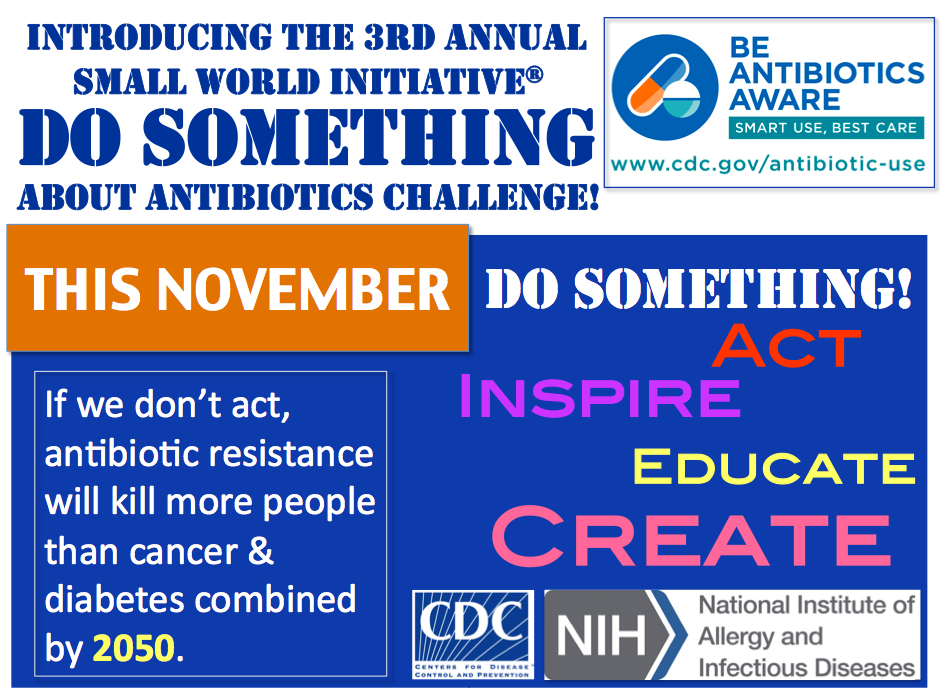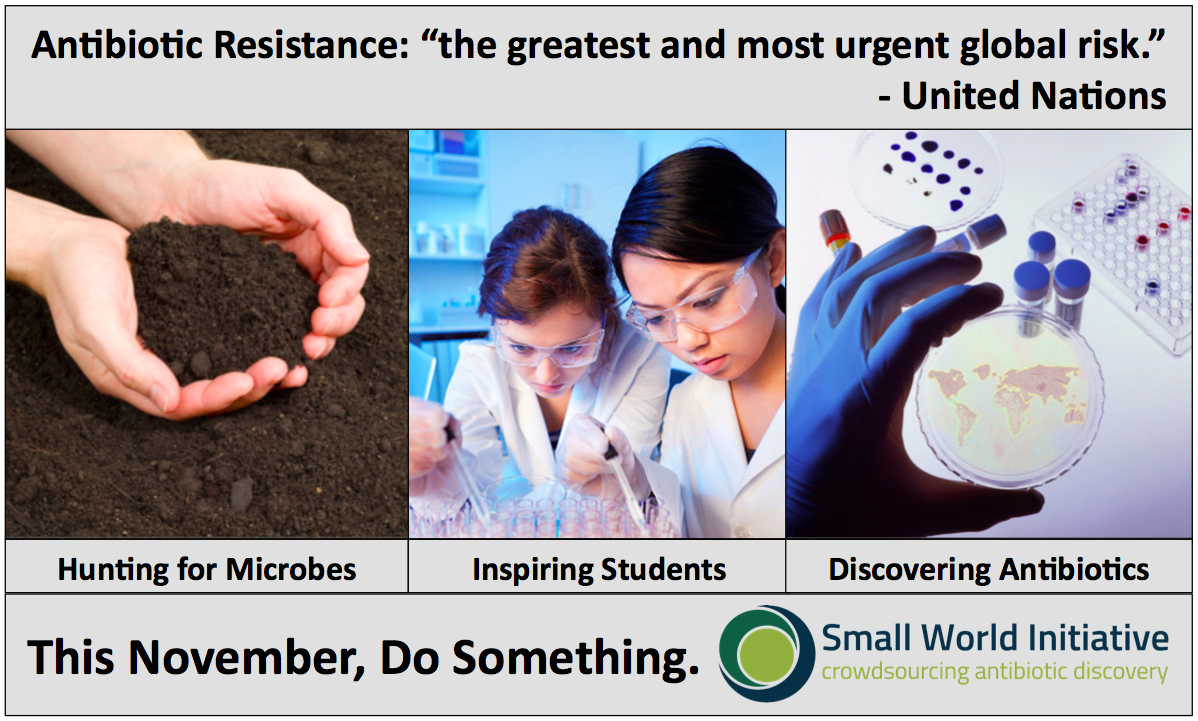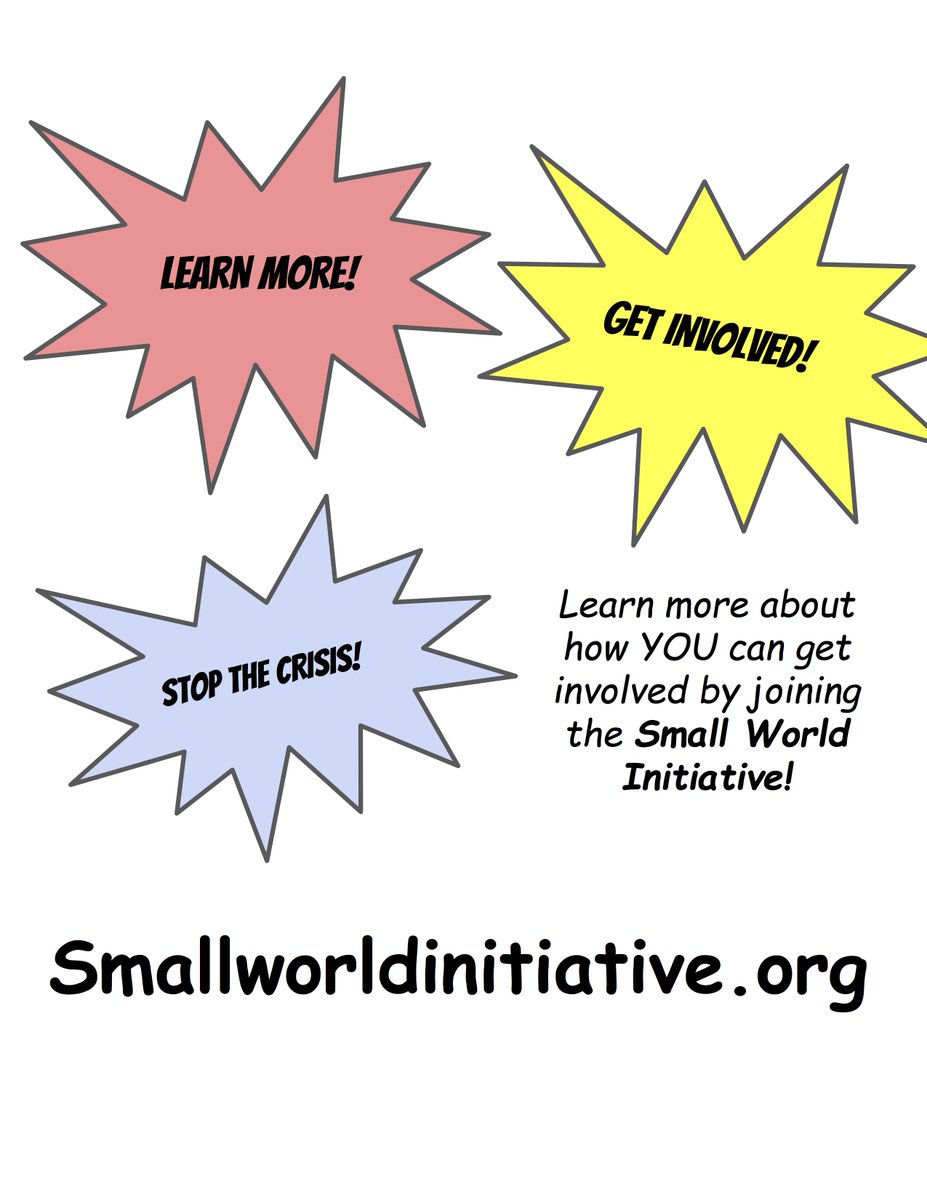The 3rd Annual Do Something About Antibiotics Challenge™
For the third year, the Small World Initiative® is challenging students to do something about superbugs and the global antibiotic crisis in recognition of the Centers for Disease Control & Prevention's (CDC) Annual Antibiotic Awareness Week (November 12th-18th) and global activities from the World Health Organization and other stakeholders. During November 2018, we are teaming up with the CDC, the National Institutes of Health (NIH), and the Sociedad Española de Microbiología to encourage students to do something about the antibiotic crisis. Superbugs are causing a global crisis, killing more than 700,000 people each year. If we do not find new antibiotics and take significant action, superbugs will become a leading cause of death worldwide by 2050, killing more people than cancer and diabetes combined. If you are a student and would like to participate, please read the challenge announcement and rules below. If you would like to see the creative and impactful ways students around the world are taking action on one of the most pressing global challenges of our time, check out last year’s entries here.
Announcement & Challenge Rules
The Do Something About Antibiotics Challenge™
Are you a current or former Small World Initiative® student?
Enter our Do Something About Antibiotics Challenge™ to make a difference and win a prize.
The Small World Initiative is teaming up with the Centers for Disease Control & Prevention (CDC), the National Institutes of Health (NIH), and the Sociedad Española de Microbiología (SEM) to encourage you to do something about the antibiotic crisis in recognition of the CDC’s Annual Antibiotic Awareness Week (November 12th-18th). This coincides with global activities from the World Health Organization, European Union, Pan-American Health Organization (PAHO), and similar organizations in Canada and Australia.
Antibiotics treat certain infections caused by bacteria. They do not treat viruses like the cold or flu. When they are not needed, antibiotics won't help you, and the side effects could still hurt you. Be Antibiotics Aware. For more information, please visit cdc.gov/antibiotic-use.
As Small World Initiative students know, antibiotic resistance – when bacteria stop responding to the drugs designed to kill them – is projected to become the most important medical challenge of the 21st century (WHO). In 2016, the United Nations called antibiotic resistance “the greatest and most urgent global risk.” Without action, we risk turning back the clock to a world where simple infections could kill otherwise healthy individuals just as they did prior to the discovery of antibiotics. In the US alone, superbugs (pathogens resistant to existing antibiotics) lead to more than 2 million illnesses, 23,000 deaths, and $35 billion in economic losses (CDC). The CDC recently announced that more than 800,000 Americans may soon be at risk of acquiring untreatable gonorrhea each year. If we continue on our current path and no significant action is taken by 2050, superbugs will kill 300 million people – more than cancer and diabetes combined (Review on Antimicrobial Resistance). Yet, pharmaceutical companies have shifted away from developing new antibiotics in favor of more lucrative ventures, and improper use of existing antibiotics exacerbates the problem.
We are running out of time on confronting one of the most pressing global challenges of our time. Yet, we possess the ingenuity to solve this problem, and we already understand the key causes and many of the possible solutions. It is not too late if we respond effectively with global collaboration. You have a very important role to play in stemming antibiotic resistance, and we are calling on you to do something.
By far, the single most important action to slow the development and spread of antibiotic-resistant infections is to improve the mass-scale misuse and overuse of antibiotics in humans and agriculture. Up to half of all antibiotics use in humans is either unnecessary or inappropriate. Each year in the US alone, doctors write at least 80 million unnecessary antibiotic prescriptions, which makes improving antibiotic prescribing a national priority (CDC). On top of that, animals consume more than twice as many medically important antibiotics as humans, and nearly all of this consumption is for growth promotion or prophylactic (Review on Antimicrobial Resistance).
Other factors include inadequate prevention and control of infections related to poor hygiene (wash hands!), access to proper sanitation and safe water, and immunization. In addition to taking action to slow the spread of infections, we need to employ collaborative ways to find new antibiotics, and we need more people to join and support the Small World Initiative in our endeavor to crowdsource antibiotic discovery.
Consider what impactful action you can take to help solve the public health emergency of our time. What can you do to help raise awareness of the threat of antibiotic resistance and get others to act?
How to Enter
You must be a current or former SWI student to be eligible. (You may enter as a team or individually.)
Do something about superbugs and the antibiotic crisis! Use one of our ideas (below) or create your own.
Share what you did online via Twitter with @Team_SWI or through SWI’s Facebook Group Page. Include the following hashtags: #dosomething #BeAntibioticsAware #AntibioticResistance #superbugs. (Remember…if a tree falls in the forest and no one is around to hear it, does it make a sound? Don’t let your important actions go unnoticed. Announce them online!)
Email a copy of your entry to info@smallworldinitiative.org. Include any attachments (e.g., images, videos, etc.), where you posted your entry (Twitter or Facebook), your full name and the names of any teammates, school, and how many people you impacted. To increase the judges’ understanding of the depth and reach of your project’s impact, this is a great place to provide any additional information that might not be obvious from the Twitter or Facebook post. For example, if you post a song or video, the judges can see how many people viewed it on YouTube or liked it on Twitter or Facebook. However, if you also played it for an audience at your school, the judges cannot see this information and would love to know how many people saw it and what actions you took to share your project.
Do Something About Antibiotics Challenge Ideas
Use these ideas or create your own! (Remember to get permission from your instructor if you are doing something on campus.)
Get inspired by last year's creative entries here.
Make a Video (max 5 minutes) – Be a director and/or an actor in your own medical genre classic bringing viewers on your journey to learn about the antibiotic crisis. Consider answering some of the following questions: What is antibiotic resistance? Why should you be concerned? What can you do about it? Where would you expect to find microbes that produce antibiotics? (For ideas, check out past entries below. Other interesting videos to get your creative juices flowing: sample 1 and sample 2.)
Team: Yuriy Maksymyuk, Sara Abboud, Jill Oates, Tara Alleyasin, Catherine Lai, Beoung Lee, Jasmine Huynh, Wayne Huynh, Marc Morada, & Alfonso Esquivel; University of California, Irvine; SWIPI: Dr. Julia Massimelli.
Team: Melissa Duran, Karina Ramirez, Carla Torres, & Nina Arutyunyan; National University; SWIPI: Dr. Ana Maria Barral.
Team: Beatriz Martin Herreros & Roberto Monllor Guerra; University of Valencia; SWIPI: Drs. Sergi Maicas & Elena G. Biosca.
Team: Joshua Bergeron, Mark Burch, Long Nguyen, & Steve Fagan; Johnson County Community College; SWIPI: Dr. Heather Seitz.
Organize an Event – Ever want to share your research with the community? Maybe, you want to host an open house and walk others through what you are doing and why it is important. Are you a movie lover? Consider screening an outbreak-style film with an important message on how to keep that from happening in real life. Like games? Consider hosting a tournament to play Gut Check or Pandemic.
Bake for Antibiotic Resistance – Do you like to practice your plating skills in the kitchen? Wonder what impact eating icing streaked, Petri-dish shaped cookies has on people? Hold an antibiotic-themed bake sale.
Measure – Wonder how many people at your school really wash their hands after using the restroom? Curious about whether your classmates demand antibiotics every time they feel sick? Create a mini-study and share your results. How does your school compare to national averages? What recommendations do you have for improvement?
Write a Song – Did you ever want to join The Voice but did not know how to incorporate your love for microbiology? Not a great singer but enjoy lip syncing while digging in soil and hunting for microbes? Make a funny song or lip sync about something related to antibiotic resistance. Check out these great entries from last year.
Hannah Schweitzer, The Ethel Walker School, SWIPIs: Drs. Julie Sheldon & Suzanne Piela
Molly Jorgenson, Johnson County Community College, SWIPI: Dr. Heather Seitz
Buzz – Create an online interactive quiz on buzzfeed to spread awareness on antibiotic resistance. Remember to follow their posting rules.
Fundraise – Add a fundraising element to your action. Consider using funds to help students at your school attend the Small World Initiative Symposium or donating to help the Small World Initiative train more educators from under-resourced schools. Film screenings and bake sales can have a fundraising element. Or, maybe, you want to design a catchy t-shirt on antibiotic resistance. Even better, create the next ice bucket challenge. Be sure to get permission from your instructor first. Let us know what you raise so that we can announce it.
Write a Comic – Consider creative ways to reach a new audience.
Team: Lauren Jasper & Emma Schell; The Ellis School; SWIPI: Dr. Kassandra Wadsworth.
Passionate about something else? Consider how you might incorporate that into our do something challenge.
Awards
We are excited to announce four award packages!
The National Institutes of Health Award Packages
The National Institutes of Health (NIH) is offering two identical award packages – one for the winning undergraduate team or student and one for the winning high school team or student. The winners will receive:
Special NIH Career Event
Are you interested in finding out about career opportunities in the sciences? Do you want to hear about how successful NIH scientists got to where they are today? The NIH will work with the winners to provide a special career event.
NIH Informational Interviews
What questions would you ask if you could have a one-on-one conversation with an NIH scientist? For winning students (up to two members of each winning team), the NIH will help facilitate and schedule informational interviews with NIH staff members and other scientists in the students’ areas of interest.
Official Congratulations from Dr. Anthony Fauci
Imagine hearing a rockstar scientist recognize your winning contribution. The Director of the National Institute of Allergy and Infectious Diseases (NIAID), Dr. Anthony Fauci, will create a video message congratulating you on winning the challenge. Dr. Fauci was appointed Director of NIAID in 1984 and oversees an extensive research portfolio of basic and applied research to prevent, diagnose, and treat established infectious diseases such as HIV/AIDS, respiratory infections, diarrheal diseases, tuberculosis, and malaria as well as emerging diseases such as Ebola and Zika. Dr. Fauci has advised five US Presidents and the US Department of Health and Human Services on HIV/AIDS and many other domestic and global health issues. He was one of the principal architects of the President’s Emergency Plan for AIDS Relief (PEPFAR), a program that has saved millions of lives throughout the developing world, and has made seminal contributions to the understanding of how HIV destroys the body's defenses leading to its susceptibility to deadly infections. Further, he has been instrumental in developing treatments that enable people with HIV to live long and active lives. Dr. Fauci has also made many contributions to basic and clinical research on the pathogenesis and treatment of immune-mediated and infectious diseases. He is one of the most cited researchers of all time.
Official NIH Award Certificate
Perfect for Snapchatting, Instagramming, and Tweeting your success to the world and proudly displaying on your wall.
International acclaim!
…or at least acclaim from the Small World Initiative and NIH. Your award will be announced on our website and through social media, and you will be profiled online.
The Centers for Disease Control and Prevention Award Package
The winner will receive:
A Much-Coveted Mentoring Session with Dr. Lauri Hicks
Dr. Hicks is a Medical Epidemiologist in the CDC’s Division of Healthcare Quality Promotion, National Center for Emerging and Zoonotic Infectious Diseases; the Medical Director for the CDC’s Antibiotic Awareness Program; the Director for the CDC’s Office of Antibiotic Stewardship in the Division of Healthcare Quality Promotion; a Captain in the US Public Health Service; and an Adjunct Assistant Professor of Medicine at the Warren Alpert Medical School of Brown University. She leads research on antibiotic use and resistance trends and serves as the Get Smart spokesperson. Globally, she has fostered CDC, European Union, and World Health Organization collaboration leading joint antibiotic awareness observances. Her expertise is in bacterial respiratory diseases, outbreak investigations, and antibiotic resistance and use.
A Special Tour of the David J. Spencer CDC Museum with an Expert
Imagine where you might fit in the history of public health as you tour the David J. Spencer Museum on a global health odyssey. Granted you might only be able to take advantage of this perk if you will be near Atlanta, Georgia.
CDC Award Certificate
Perfect for Snapchatting, Instagramming, and Tweeting your success to the world and proudly displaying on your wall.
CDC Swag
International acclaim!
…or at least acclaim from the Small World Initiative and CDC Antibiotics Awareness Program. Your award will be announced on our website and through social media, and you will be profiled online.
Sociedad Española de Microbiología Award Package
The Sociedad Española de Microbiología (SEM) is offering one award package to an applicant from Spain or Portugal. The winner will receive:
SEM National Meeting Invitation
The winner will receive an invitation to the SWI@Spain/MicroMundo National Symposium during summer 2019 where he/she will have the chance to meet researchers and the SEM Young Researchers group.
SEM Award Certificate
The Sociedad Española de Microbiología's Education Division (D+D) will award a Spanish SWI-D+DSEM award that will be given at their National Meeting. Perfect for Snapchatting, Instagramming, and Tweeting your success to the world and proudly displaying on your wall.
International acclaim!
…or at least acclaim from the Small World Initiative and SEM. Your award will be announced on our website and through social media, and you will be profiled online.
Note: All other student entries will be posted on a special page on the Small World Initiative website.
Deadline
Friday, November 30th
Resources
SWI Do Something About Antibiotics Challenge™ Toolkit (posters, flyer, and handouts)
CDC Toolkit (sample text, infographics, posters, animations, videos, handouts)
How Winners Are Selected
Winners will be selected based on the depth and reach of the impact of their actions. A Selection Committee will be made up of judges from the Small World Initiative and CDC and NIH staff. Any conflicted parties will not vote on the final winner.
Restrictions
Don’t be offensive! While we understand that there is sometimes a fine line between what one person considers funny and another person considers offensive, SWI leadership will make final determinations on what is offensive. Any offensive entries should be immediately taken down upon request.
Submission Usage
By submitting an entry, entrants grant Small World Initiative® an irrevocable license to use, repost, and publish entries. Entrants will be credited if/when their entries are used.
More Information
The Small World Initiative’s Do Something About Antibiotics Challenge™ is part of our Do Something Challenge™ series. For more information, please call us at 347-762-4818 or contact us.
The Small World Initiative® is a registered 501(c)(3) public charity, and donations to SWI are tax-deductible to the full extent of the law.















